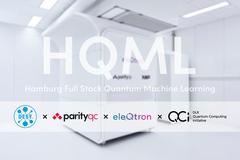Members of the consortium are DESY, the company ParityQC, the start-up eleQtron and the DLR Quantum Computing Initiative (DLR QCI) Image: DLR QCI
A new consortium consisting of ParityQC, DESY, eleQtron and the DLR Quantum Computing Initiative (DLR QCI) has successfully qualified for funding in the framework of the “Quantum Computing Funding Initiative” of the Hamburg Investment and Development Bank (IFB Hamburg). In the HQML (Hamburg Full Stack Quantum Machine Learning) project, the companies and DESY are working together with the DLR QCI to develop a full stack quantum solution for image data processing. The consortium will cover the entire chain of innovation, from the specific application field to the development of the required novel algorithms. This is unique in Hamburg so far, and HQML is one of the first projects of its kind in Germany and worldwide.
The new technology promises to be able to generate and process extensive image data much faster than with conventional computers. The specific application is the processing of the huge amounts of data that are generated during experiments at the Large Hadron Collider (LHC) at CERN in Geneva. LHC is the largest and most powerful particle accelerator facility in the world, where physicists collide protons at the speed of light in order to study the decay processes and products using extremely high-resolution sensors and thus research and answer open questions about our physical world view. Image data processing with conventional computers is already reaching its limits. Alternative calculation methods for the LHC upgrade must be found in 2032 at the latest.
Quantum computers can provide a solution because, unlike conventional computers, they can not only perform calculations in an extremely fast way, but also account for several states at the same time. This is also the case when analyzing image data. Using artificial intelligence, patterns can be recognized very quickly, but this is expected to be much faster using quantum machine learning (QML). This requires not only the right quantum hardware but, above all, the right algorithms. The aim of the project is to develop both. Kerstin Borras, senior scientist at DESY, emphasizes that the results will bring benefits to fields beyond particle physics: "The new technology could also be used in modern medical diagnostics, environmental analysis and even in modeling stock movements in the economy. Anywhere where large amounts of image data need to be processed as quickly as possible."
The partners involved bring their respective strengths to the HQML project. The internationally active company for digital and analog quantum computing architecture ParityQC is taking over the leadership of the consortium. Through a co-design of hardware and software, ParityQC will develop and optimize the QML algorithms for the QSea I quantum computer of the DLR Quantum Computing Initiative, creating the crucial interface for the project's quantum computing stack. Through innovative quantum algorithm design aided by the ParityQC Architecture, the QML methods are improved and optimally compiled for the hardware. ParityQC will contribute its wealth of experience in the development of corresponding hardware and software.
In the project, DESY is providing the basic algorithms obtained from research on its own images from the particle accelerator. As an IBM Quantum Hub, DESY has direct access to IBM's quantum computers, on which the QML algorithms were tested and which are therefore used in the project for comparison with the new hardware.
The DLR Quantum Computing Initiative brings together research, start-ups and industry at its innovation centers to jointly develop quantum computers and promising use cases. At the DLR QCI innovation center in Hamburg, the consortium consisting of eleQtron, NXP and ParityQC is currently developing two quantum computers, QSea I and QSea II, on behalf of DLR QCI, with QSea I scheduled to be completed first. For HQML, DLR QCI is providing operating time on the QSea I quantum computer. The quantum computer is based on ion traps: the ions are captured using electric fields and controlled by microwaves and laser beams to serve as a storage unit or qubit. In addition to operating time, DLR QCI is also working on benchmarking the new hardware.
Finally, the start-up eleQtron is a spin-off of the Siegen Chair of Experimental Quantum Optics, which operates the first ever German quantum computer. The company has various patents for the precise control of new types of ion processors using radio waves and is the market leader in this field.
“We are delighted that, with this project, we are among the first in the quantum computing field to bring together fundamental research, applied research and industry to jointly tackle the great challenge of big data,” says Arik Willner, Chief Technology Officer at DESY. “With our combined expertise, we can establish Hamburg and Germany as a leading hub for this industry.”








